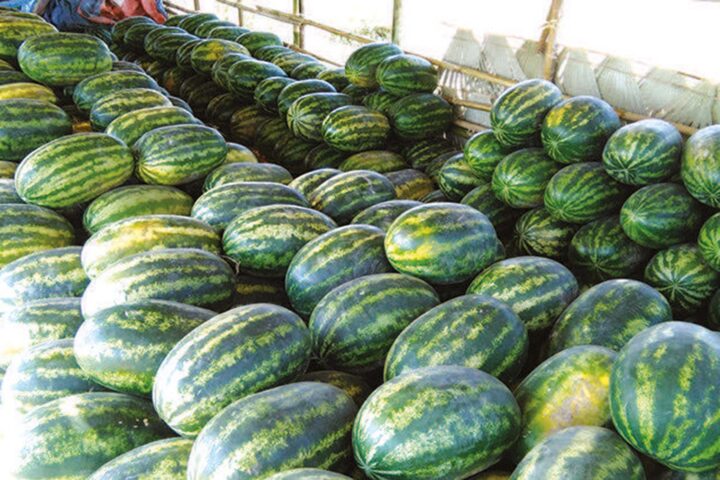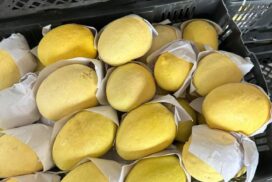As watermelon and muskmelon exported to China do not meet quality requirements, it keeps the price low, said fruit traders engaged in Muse border.
Chinese New Year falls on 22 January 2023. Consequently, the fruit market was expected to be bustling. Yet, poor quality lowered the price and the market is slow moving, said Sai Khin Maung from Khwanyo Fruit Depot.
“Among export items, fruit sales need to stay organized. There is poor quality control and self-control in trade so the market is sluggish. Some harvested the fruits without reaching the maturity stage. Chinese buyers underpriced watermelons due to quality requirements,” he elaborated.
The prices stood at 4.7-4.8 Yuan per kilogramme for 855 watermelon of good quality, 5.1-5.2 Yuan for Taiwan watermelons and 6-6.5 Yuan for muskmelon depending on quality in recent days.
At present, poor quality brought down the prices to 3.5-4.3 Yuan for 855 watermelons, 3.5-4.5 for Taiwan watermelons and 3.5-5.3 Yuan for muskmelon.
“As some growers sell unripe watermelon, the market is in chaos. Self-discipline and self-control are required in executing a trade to maintain market share,” Ko Soe Moe July from North East Gate Fruit posted on social media on 13 January 2023.
At the end of the last year 2022, the fruits did not fetch a good price due to inferior quality. In the past years, poor quality eroded customers’ trust and lost market share. Quality plays a crucial role in the market so the traders called for the growers to supply watermelons and muskmelons of good quality.
Additionally, Sai Khin Maung added that they will face challenges to earn a strong market share in the post-coronavirus period.
Myanmar’s watermelon and muskmelon are heavily reliant on the Chinese market. The traders grappled with China’s strict virus policy.
Last year, the COVID-19 restrictions hindered Myanmar’s watermelon and muskmelon exports to China. Chinese Customs Regulation increased delay. Long delays of trucks caused harm to watermelon quality and only one in five trucks heading to China remained undamaged with quality watermelons.
The traders are observing delivery time, price and profitability as they are perishable fruit, while they are trying to explore new markets besides China.
On 1 April, Nantaw and Sinphyu border posts were suspended in the wake of COVID-19 impacts. China has closed down the major border crossing Mang Wein from 30 March 2021 following COVID-19 cases in Myanmar.
On 8 July 2021, the two-remaining cross-border posts Kyinsankyawt and Panseng were suspended. As a result of this, the border trade between Myanmar and China was completely halted.
Among Sino-Myanmar border posts, the Kyinsankyawt border resumed operations on 26 November on a trial run.
On 8 January 2023, Some Sino-Myanmar border crossings were declared to resume their operations, including Sinphyu, Nantaw and Mang Wein, which is a major border post between Myanmar and China. However, they are yet to be reopened.
At present, Myanmar daily delivers rice, broken rice, rubber, various beans and pulses, fishery products, chilli pepper and other food commodities to China through Kyinsankyawt by 100 trucks and building materials, electrical appliances, household goods and industrial raw materials are imported into the country by 40 trucks.—NN/EMM
Poor quality of watermelon, muskmelon sparks lower price
- January 14, 2023
- 723














